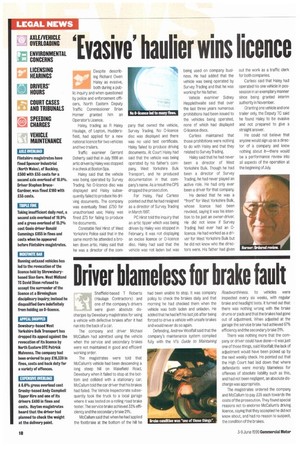Driver blameless for brake fault
Page 20

If you've noticed an error in this article please click here to report it so we can fix it.
Sheffield-based T Roberts (Haulage Contractors) and one of the company's drivers were given absolute discharges by Dewsbury magistrates for using a vehicle with defective brakes after it had run into the back of a car,
The company and driver Michael McCallum had admitted using the vehicle when the service and secondary brakes were not maintained in good and efficient working order.
The magistrates were told that McCallum's vehicle had been descending a long steep hill on Wakefield Road, Dewsbury when it failed to stop at the bottom and collided with a stationary car. McCallum told the car driver that his brakes had failed. The Vehicle Inspectorate subsequently took the truck to a local garage where it was tested on a rolling road brake tester. The service brake achieved 33% efficiency and the secondary brake 21%.
McCallum said that when he had applied the footbrake at the bottom of the hill he had been unable to stop. It was company policy to check the brakes daily and that morning he had checked them when the vehicle was both laden and unladen. He added that he had left his last job after being forced to drive a vehicle with unsafe brakes and would never do so again.
Defending, Andrew Woolfall said that the company's maintenance system complied fully with the VI's Guide to Maintaining Roadworthiness. Its vehicles were inspected every six weeks, with regular brake and headlight tests. It turned out that there was nothing wrong with the brake drums or pads and that the brakes had gone out of adjustment. When adjusted at the garage the service brake had achieved 67% efficiency and the secondary brake 21%.
There was nothing more that the company or driver could have done—it was just one of those things, said Woolfall; the lack of adjustment would have been picked up by the next weekly check. He pointed out that the High Court had laid down that where defendants were morally blameless for offences of absolute liability such as this, and had not been negligent, an absolute discharge was appropriate.
The magistrates ordered the company and McCallum to pay £35 each towards the costs of the prosecution. They found special reasons not to endorse McCallum's driving licence, saying that they accepted he did not know about, and had no reason to suspect, the condition of the brakes.














































































































